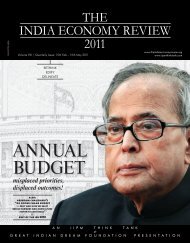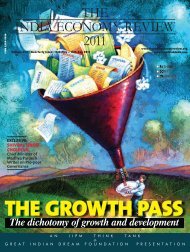Download - The India Economy Review
Download - The India Economy Review
Download - The India Economy Review
You also want an ePaper? Increase the reach of your titles
YUMPU automatically turns print PDFs into web optimized ePapers that Google loves.
fact, an in-house meeting of the State<br />
Planning Board may be organized for<br />
the kind of role performed by the State<br />
Planning Board vis-a vis those of the<br />
Planning Commission before any reforms<br />
in this area is contemplated.<br />
7. <strong>The</strong> plurality in the understanding of<br />
the planning process of District plan is<br />
an area where State Planning Board<br />
could take a meeting of its own, fi rm-up<br />
its common understanding and then<br />
sensitize the others.<br />
<strong>The</strong> planning formulated from Gram<br />
Samsad at the rural area & booth committees<br />
of Nagar Palikas at urban situation<br />
should ensure the resource mapping by<br />
participatory neighbourhood survey as<br />
stated before. This should be transmitted<br />
to Block Planning Committees who will<br />
refer it to D.P.C. <strong>The</strong> State Planning<br />
Board being involved at every step would<br />
be able to prepare an optimum planning<br />
for the State which will be presented to<br />
the Planning Commission at the Centre.<br />
This proposal if accepted will legitimise<br />
the existence of Planning Commission and<br />
also the State Planning Boards.<br />
Conclusion<br />
<strong>India</strong>, like all developing countries, is in a<br />
cross-road for its developmental process.<br />
Planned development instituted by Socialist<br />
Russia had initial success particularly<br />
benefi ting the erstwhile marginalised<br />
people. Subsequently this failed to deliver<br />
ultimate solution for human emancipation.<br />
<strong>The</strong> reasons of this failure have not<br />
yet been properly analysed.<br />
Imperialism in the pretext of globalisation,<br />
Neo Liberalisation and imposition of<br />
market economy is bound to impose further<br />
misery over the poor countries. <strong>The</strong><br />
poor people in every country, even in the<br />
developed ones, will also be severely af-<br />
fected. A rational solution may be found<br />
through a synthesis of both the systems<br />
e.g. planned and market economy. This<br />
will facilitate the proper function of the<br />
planning institution. <strong>The</strong> developed countries<br />
should abandon their aggressive<br />
greed for profi t through commercialisation<br />
of basic human services like health,<br />
education & adequate amenities of life. In<br />
ancient period countries who achieved<br />
acme of glory learnt that material benefi t<br />
alone fails to provide peace and perfection<br />
to the human beings. <strong>The</strong>y taught<br />
people to sacrifi ce so that ultimate emancipation<br />
is achieved.<br />
<strong>The</strong> planning procedure in <strong>India</strong> should<br />
welcome the phenomenal advancement<br />
of techno science but it should also pay<br />
equal importance on the social aspect of<br />
science. <strong>The</strong> planners at all levels should<br />
understand that complete eco-friendly<br />
development is impossible but the best<br />
planning should attempt to minimise the<br />
onslaught on Nature.<br />
A synthesis between the knowledge of<br />
the experts and wisdom of a wise common<br />
man should provide the solution.<br />
Endnotes<br />
1 Personal communication from Prof.<br />
Nipen Bandyopadhyay (Former Researcher,<br />
Shantiniketan), Member, State<br />
Planning Board, Govt. of West Bengal<br />
2 http://www.idianetzone.com/45/plan-<br />
ning_commission_india.htm<br />
3 Planning Commission (<strong>India</strong>), Wikipedia,<br />
the free encyclopedia.<br />
4 Ashok Mehta Committee - Wikipedia,<br />
the free encyclopedia.<br />
5 Formation of State Planning Board,<br />
West Bengal – <strong>The</strong> Calcutta Gazette<br />
Extraordinary dt. 13th May 1972.<br />
6 wbplan.gov.in/docs/AnnualRe-<br />
port200809/Planning%20Sector.pdf<br />
T RANSFORMATIVE PLANNING<br />
7 Planning from below by the villagers<br />
themselves in Bengali Language:<br />
Published by Panchayat and Rural<br />
Development Department, Governemt<br />
of <strong>India</strong>.<br />
References and<br />
Additional Thinking<br />
• ‘Studies in Bengal Renaissance’, published<br />
by National Council of Education,<br />
Bengal, Kolkata – 32, 3rd Edition,<br />
March 2002.<br />
• State Planning Board, West Bengal<br />
(1972-75) Published by State Planning<br />
Board, 6, Camac Street, Kolkata.<br />
• ‘Being <strong>India</strong>n’ by Pravin Kumar.World<br />
Bank Report on Health (1992).<br />
• ‘Promised but not Implemented (Treatise<br />
of Health Policy)’ by Dr. Gouri<br />
Pada Dutta. Published by Asok Kumar<br />
Pal, 53, Creek Row, Kolkata–700014;<br />
April 2003.<br />
• ‘People & Power’ (Devolution of power<br />
to people through Panchayat in West<br />
Bengal) by Dr. Gouri Pada Dutta. Published<br />
by West Bengal Voluntary<br />
Health Association, 19A, Dr. Sundari<br />
Mohan Avenue, Kolkata – 700014;<br />
Web:- www.wbvha.org<br />
• ‘Social Issues of Health’ by Dr. Gouri<br />
Pada Dutta. Published by Suresh<br />
Bhadra, Pratyaya, 24/1B, Creek Row,<br />
Kolkata – 700014; April<br />
• Jiboner Aaina (in Bengali) (i.e. Through<br />
the Mirror of Life) (collection of essays)<br />
by Dr. Gouri Pada Dutta. Published by<br />
Kanika Chakraborty, Effect Publication,<br />
DC – 116, Narayantala (West)<br />
Desh Bandhu Nagar, VIP Road,<br />
Kolkata – 700059; 2009 AD<br />
(<strong>The</strong> views expressed in the write-up are<br />
personal and do not reflect the offi cial<br />
policy or position of the organization.)<br />
THE INDIA ECONOMY REVIEW<br />
85





